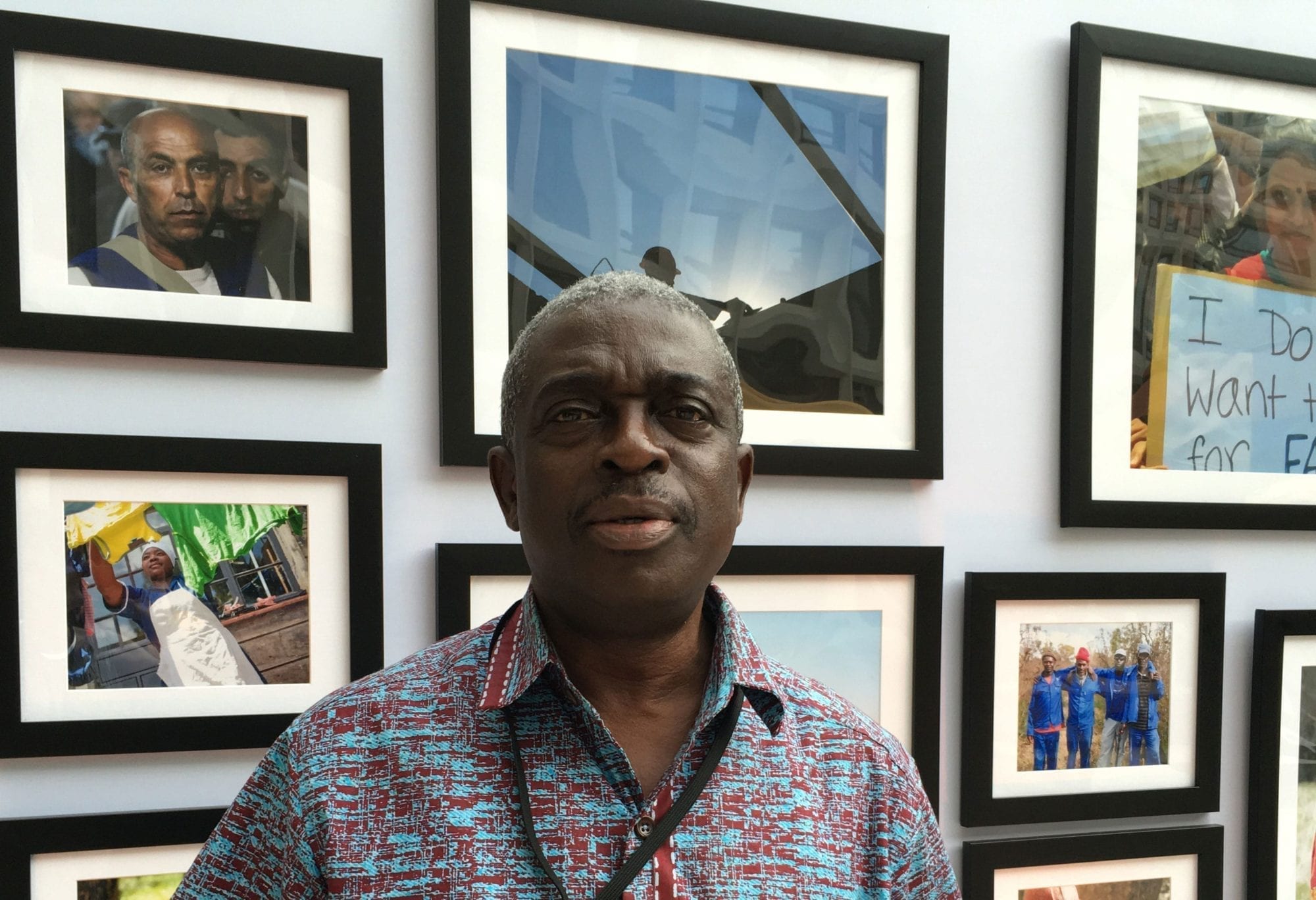
May 31, 2016
Participants at the 2016 Coalition of Black Trade Unionists (CBTU) convention joined the Solidarity Center to celebrate 20 years of working together at a gathering that also launched the first of a year-long series of events marking the Solidarity Center’s 20th anniversary in 2017.
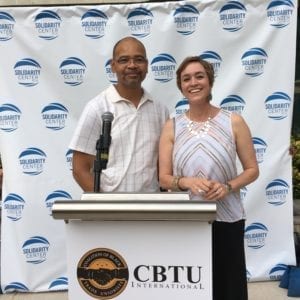
CBTU President Terry Melvin and Solidarity Center Executive Director Shawna Bader-Blau open the 20th anniversary event. Credit: Solidarity Center/Tula Connell
Speaking at the May 27 reception in Washington, D.C., CBTU President Terry Melvin, who serves on the Solidarity Center Board of Directors, said, “The issues affecting workers of color are very similar around the world. I believe there are things we can learn from South Africa, from Europe, that can help us be better trade unionists.”
Opening the event, Solidarity Center Executive Director Shawna Bader-Blau said “We are proud the Solidarity Center has been allied with CBTU in the struggle to achieve worker rights around the globe for the past 20 years.”
In 2014, CBTU met with top African union leaders in high-level meetings organized by the Solidarity Center during the U.S.-Africa Leaders’ Summit in Washington, D.C., and presented recommendations on jobs, gender equality, inclusive economic development and pro-poor investment to African heads of state.
Solidarity Center and CBTU Partners in Brazil
The Solidarity Center and CBTU also have worked in Brazil with INSPIR (the Inter-American Union Institute for Racial Equality) for the past 20 years to help eliminate racism against Afro-descendants in the workplace and throughout society. Afro-descendants comprise more than half the Brazilian population, yet are systematically discriminated against in the labor market.

UAW members Janice Hodges from Ft. Wayne, Indiana, and Melvin Prince from Kansas City, Missouri, were among CBTU members taking part in 20th anniversary celebrations. Credit: Solidarity Center/Tula Connell
Former CBTU president and AFSCME Secretary-Treasurer Emeritus Bill Lucy, who recently retired from the Solidarity Center Board, told participants that after his first fact-finding trip to Brazil with the AFL-CIO 20 years ago, he saw “directly how racial discrimination played out in many ways similarly to what we were fighting (and continue to fight) together against and organizing to overcome in the US.
“The Solidarity Center office in Brazil since then has been a key supporter and funder of this work, which I was proud of then and continue to be glad to see,” he said.
“The Solidarity Center mission is to strengthen workers’ rights around the globe,” said Jos Williams, who recently retired as leader of the Metro Washington Labor Council, and as Solidarity Center Board member. “They did that knowing that one of the best partners they have is CBTU.”
CBTU Members Take Part in International Labor Workshops
Earlier that day, CBTU conference participants attended an international plenary featuring Kwasi Adu-Amankwah, the general secretary of the International Trade Union Confederation Africa Region (ITUC-Africa) and Maria Julia Nogueira, secretary for racial equality at the Central Unica dos Trabalhadores (CUT) in Brazil.
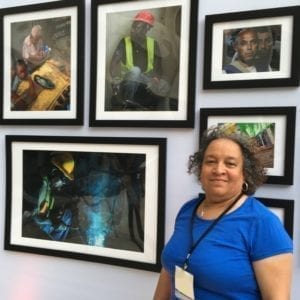
“We are all facing the same struggle”–Lois Carson, a state vice president of the Ohio Association of Public School Employees/AFSCME. Credit: Solidarity Center/Tula Connell
The workshops focused on the struggles African unions and communities are waging against corporate globalization, and on the historic parallels and similar dynamics of racial inequality in the United States and Brazil.
“We are all facing the same struggle,” said Lois Carson, a state vice president of the Ohio Association of Public School Employees/AFSCME, who attended the plenary. “No matter what country, what region, everywhere workers are underpaid, working in bad conditions.”
From Kansas City, Missouri, Melvin Prince, a UAW Local 31 member and CBTU conference participant, put it this way:
“The only way we’re going to get something done is to work together and stick together.”
At the event, the Solidarity Center made available for donation more than one dozen framed photos and posters depicting workers we work with around the world. All donations go to help Solidarity Center’s efforts to help empower workers around the globe.
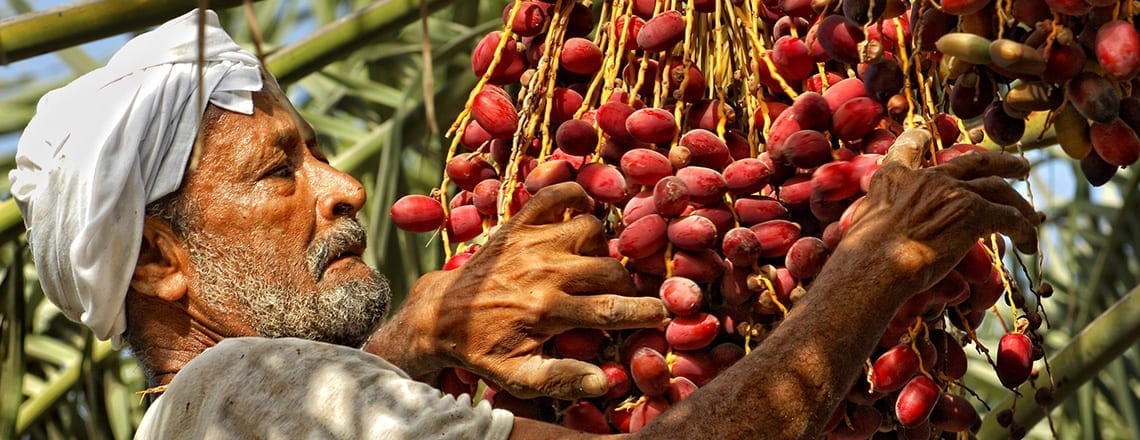
May 23, 2016
Update: The survey is now available in Spanish and French.
La encuesta está disponible en francés y español.
L’enquête est disponible en français et espagnol.
The United Nations Special Rapporteur is partnering with the Solidarity Center to research a report on the links between the political, social, and economic exclusion of workers, their associations and trade unions. The following article from the UN Special Rapporteur website describes how you can participate.
The globalization of the world economy in the past half-century has contributed to a dramatic rise in the power of large multinational corporations and has concentrated wealth in fewer hands. State power to regulate these business entities, meanwhile, has been simultaneously eroded and co-opted by elite economic actors themselves.
Unconstrained power – whether public or private in origin – is now, more than ever, a critical threat to the protection of human rights. This power shift has created a challenging environment for the enforcement of human rights, as Special Rapporteur Maina Kiai has documented in his two most recent reports on natural resource exploitation and the imbalance between how States treat businesses and civil society.
For his next report to the UN General Assembly (October 2016), the Special Rapporteur plans to explore a new dimension of this power shift: its effect on the rights to freedom of peaceful assembly and of association of workers – specifically the most marginalized portions of the world’s labor force, such as global supply chain workers, informal workers, migrant workers and domestic workers. He will also examine the gender and racial dimensions of the issue.
The Special Rapporteur is particularly interested in the links between the political, social, and economic exclusion of workers, their associations and trade unions, as expressed in:
- The limitation and/or criminalization of assembly and association rights in law and in practice (and acquiescence of the State when these rights are breached by state or private actors);
- The exclusion of workers in the informal economy from legal frameworks recognizing assembly and association rights;
- The strategy to informalize more work for the purpose of limiting or excluding workers from exercising their assembly and association rights;
- The lack of effective global governance of migration, which has led to the exploitation of migrant workers
The Special Rapporteur will also explore the interplay between the lack of assembly and association rights for workers and the health of these rights within a society as a whole.
What’s your opinion and experience?
The Special Rapporteur convened an expert consultation to discuss this subject in May 2016. But he would also like to hear your views. He is particularly interested in specific, real-world examples of how the assembly and association rights of workers are being both eroded and bolstered. These examples may be included in the report.
How to submit information for the report
For more details on the report, please see our concept note. For specific questions that the Special Rapporteur is looking to answer, please see the following questionnaires. Note that each file has three separate questionnaires: One for UN member states, one for businesses and one for civil society/unions/workers. Please answer only the questionnaire that corresponds to your position:
Questionnaires in English
Questionnaires in Spanish (coming soon)
Questionnaires in French (coming soon)
In responding to the questionnaire, please be sure to provide as much detail as possible and to specify which countries you are referring to.
Completed questionnaires should be e-mailed to [email protected]. We will be accepting submissions until June 30, 2016. You may submit your responses in English, French or Spanish.
The Solidarity Center will assist with researching the report. Responses to the questionnaires will be shared with select Solidarity Center staff prior to the publication of the report.
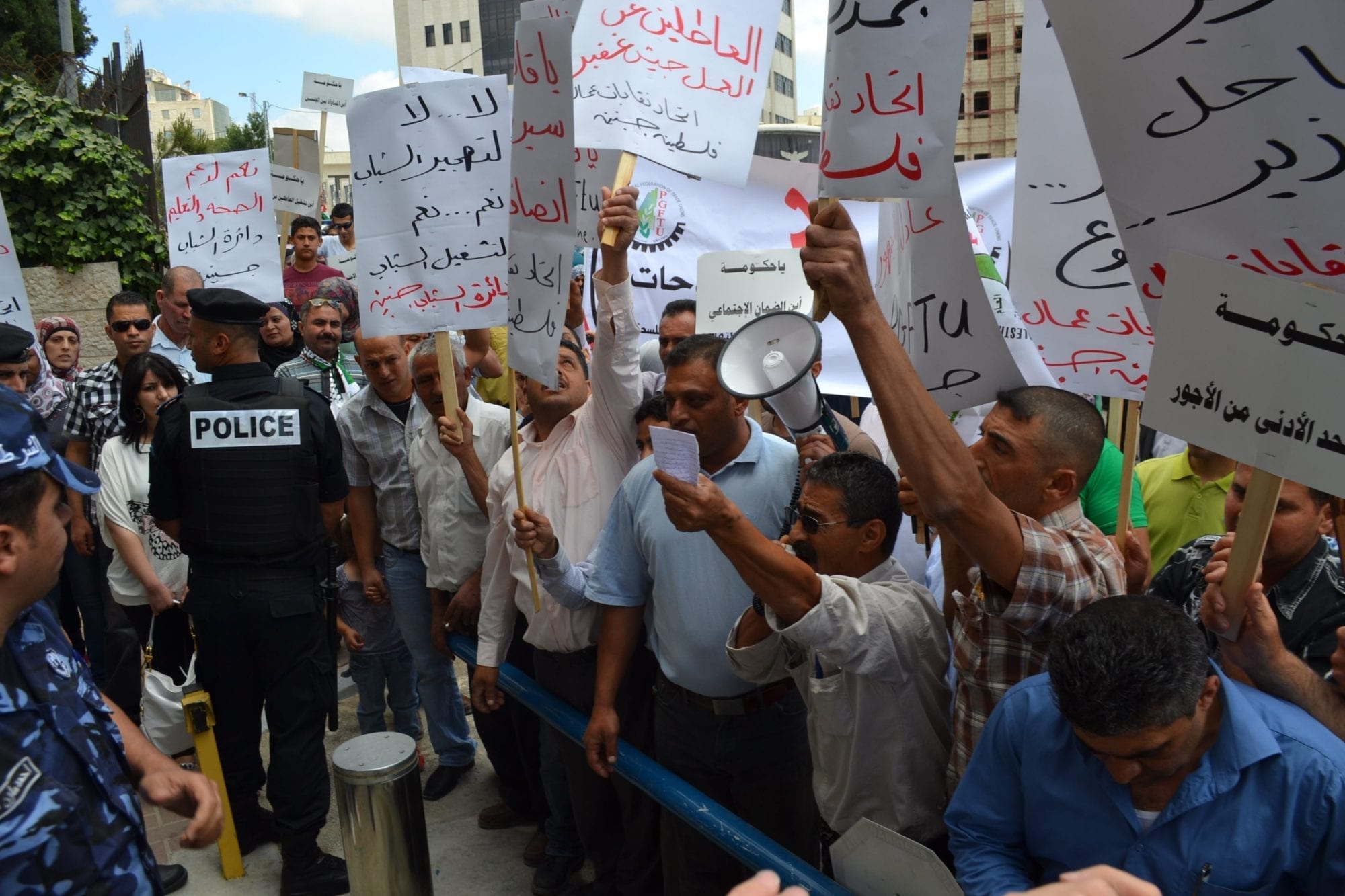
May 5, 2016
More than 300 the Palestinian General Federation of Trade Unions (PGFTU) members took part in the PGFTU Congress in Nablus late last month, where delegates voted to boost representation of women and reinforced the federation’s commitment to worker rights. They were joined by representatives from 16 international organizations, including the International Trade Union Confederation (ITUC), the Solidarity Center and the International Labor Organization (ILO).
Delegates at PGFTU’s Fifth Congress voted to increase from 20 percent to 30 percent the representation of women across all PGFTU bodies over the next four years; agreed to enforce Palestine’s minimum wage law and work to make it a living wage; and reinforced the PGFTU’s stance in defending the freedom to form unions.
Also during the three-day conference, PGFTU General Council members elected Shaher Saad as secretary general and voted in 24 representatives of national general unions, including four women, to the executive committee, along with seven men and women unionists to the financial and administrative audit committee. All will serve four-year terms. The elections were observed by representations from the ILO, the Arab Labor Organization and U.S. and European trade unions and federations.
Delegates backed ongoing dialogue with allies as the PGFTU campaigns for fair labor laws that guarantee decent work for workers and a fair social security law for workers and their families. In ensuring that women make up 30 percent of the federation’s leadership, delegates seek to guarantee their input in designing labor policies and executing union resolutions and reinforced their commitment to promoting the role of Palestinian working women as a key force in the national and local markets.
Participants also emphasized the need to network with civil society organizations and legal groups that to work toward establishing a democratic and transparent civil society.
In his remarks, Saad said workers will achieve social justice and fairness through a strong and independent trade union movement that seeks to elevate workers’ voices and protect him from exploitation.
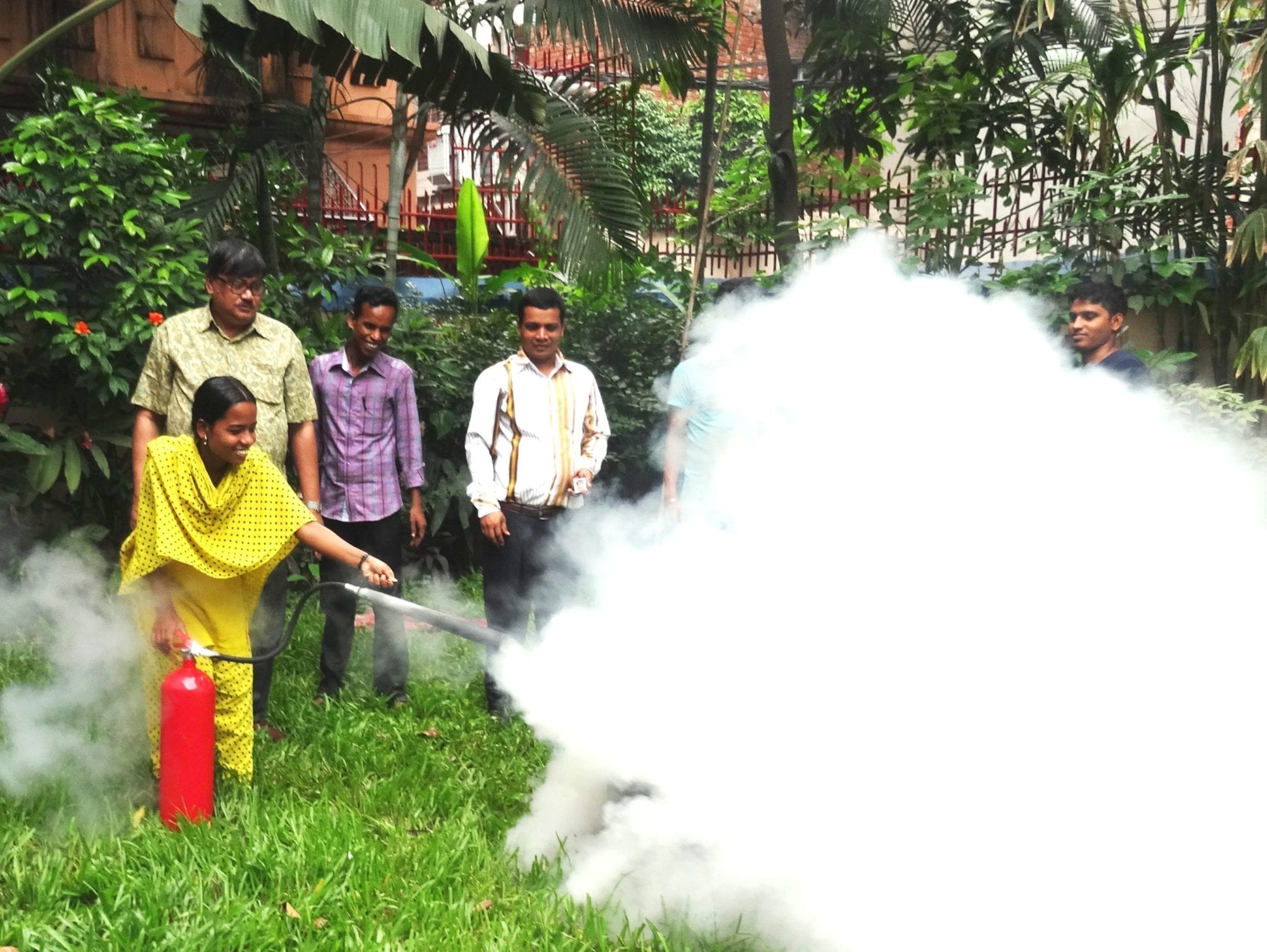
Apr 21, 2016
On April 24, 2013, the Rana Plaza garment factory building in Bangladesh collapsed, trapping thousands of workers and ultimately killing more than 1,130 garment workers in a preventable workplace disaster.
The tragedy came five months after a fire tore through Tazreen Fashions Ltd., killing more than 100 Bangladesh garment workers.
“Rana Plaza was a clarion call for deep, fundamental change in Bangladesh’s apparel sector.”
-U.S. AMBASSADOR TO BANGLADESH DAN MOZENA
The day before Rana Plaza collapsed, a structural engineer reported cracks in the building so dangerous, he recommended it be closed. Workers were afraid, but factory managers said if they did not show up the next day, their pay would be cut or they would be suspended.
NO ONE SHOULD HAVE TO GO TO WORK AFRAID
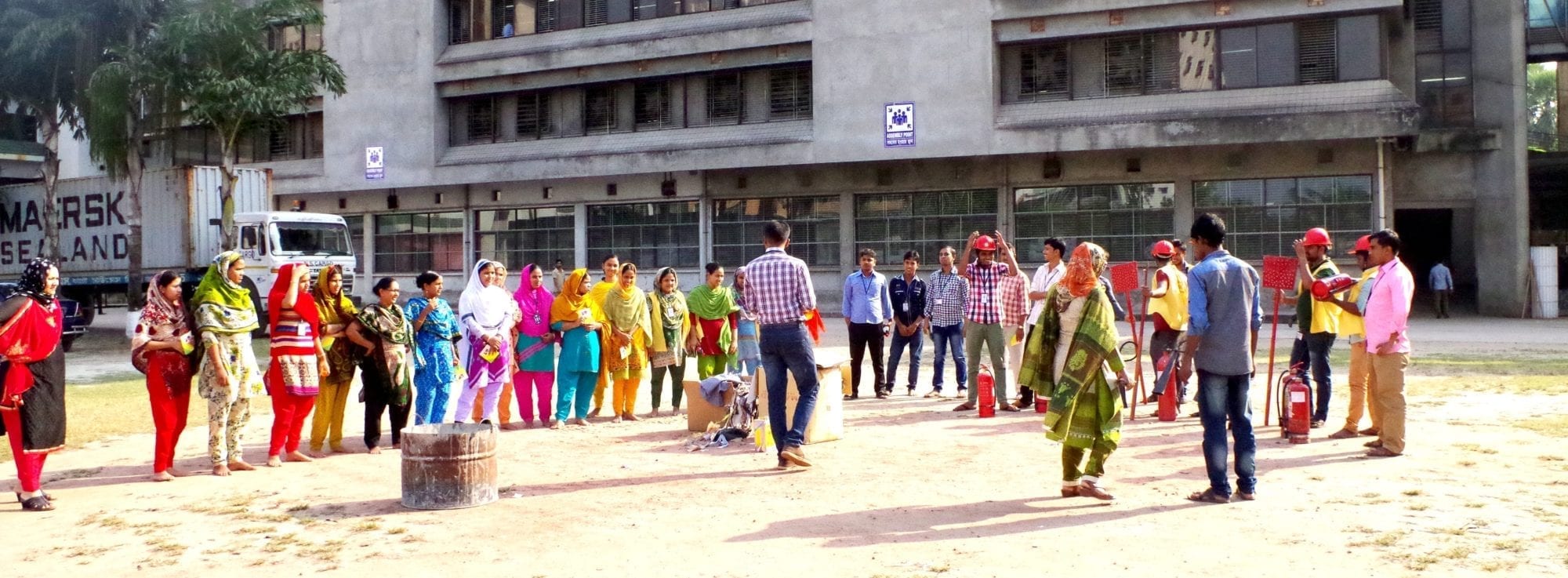
Photo credit: Solidarity Center
Three years later, 176 union leaders have completed the Solidarity Center’s fire safety certification training program, putting 62 Bangladesh garment factories on a path towards safer working conditions. The Solidarity Center has held nine 10-week intensive training courses on fire and building safety.
Through the Fire and Building Safety course, garment workers, union leaders and factory management learn about fire and building safety codes and preventative measures, and practice steps to take in an emergency. Garment workers take part in hands-on training with fire extinguishers to gain experience and confidence.
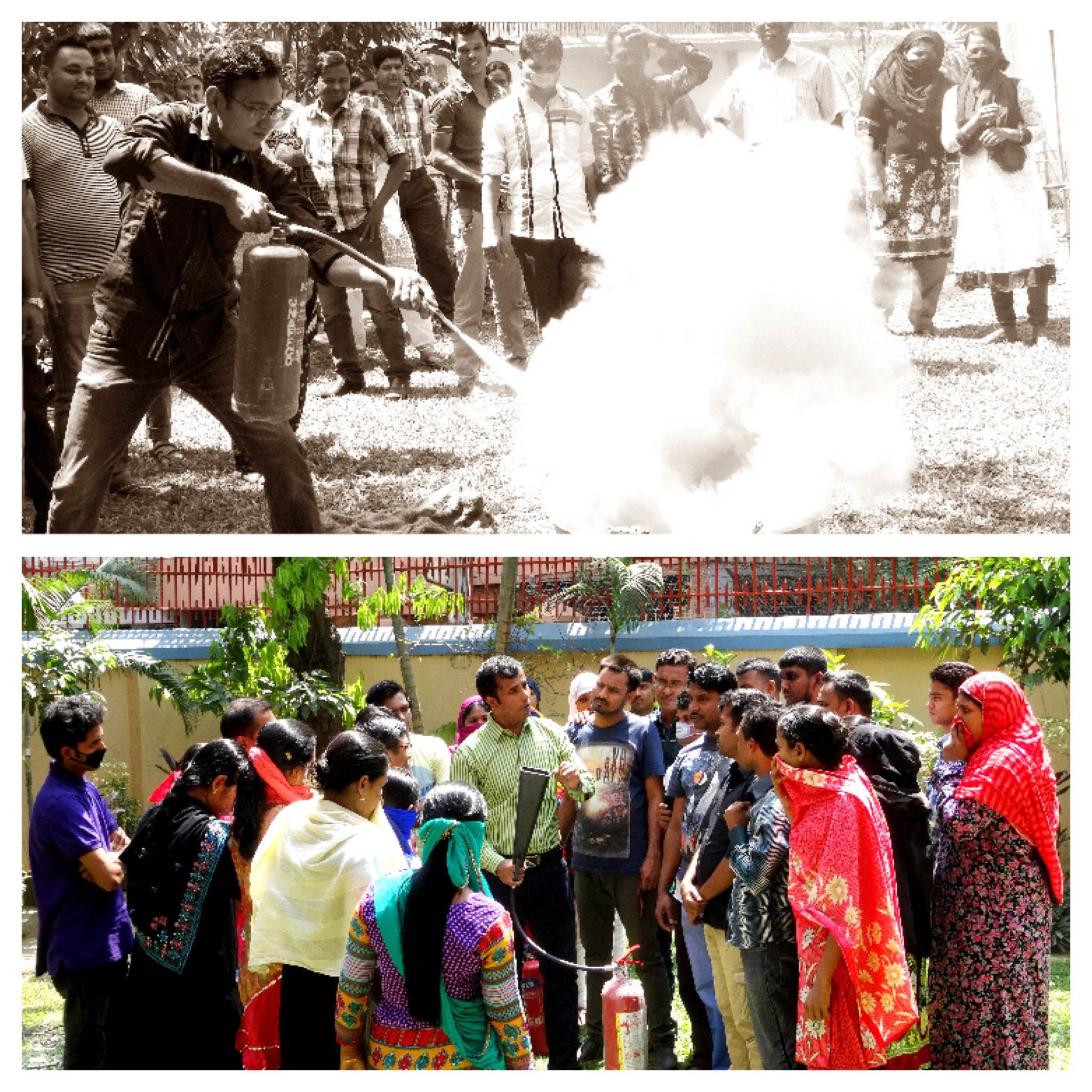
Credit: Solidarity Center
Tahsin Khan, a mechanic at Aliza Fashion Limited, had taken a fire safety training years ago, but the course did not include hands-on practice and he says he was never confident enough to apply what he learned. The Solidarity Center course encouraged him and provided the practice he needs to potentially save lives at his workplace.
“We are now confident after the training that we can help factory management and other workers if there is any incident of fire in our factory.”
-MOSAMMAT DOLI, UNION LEADER (BGIWF)
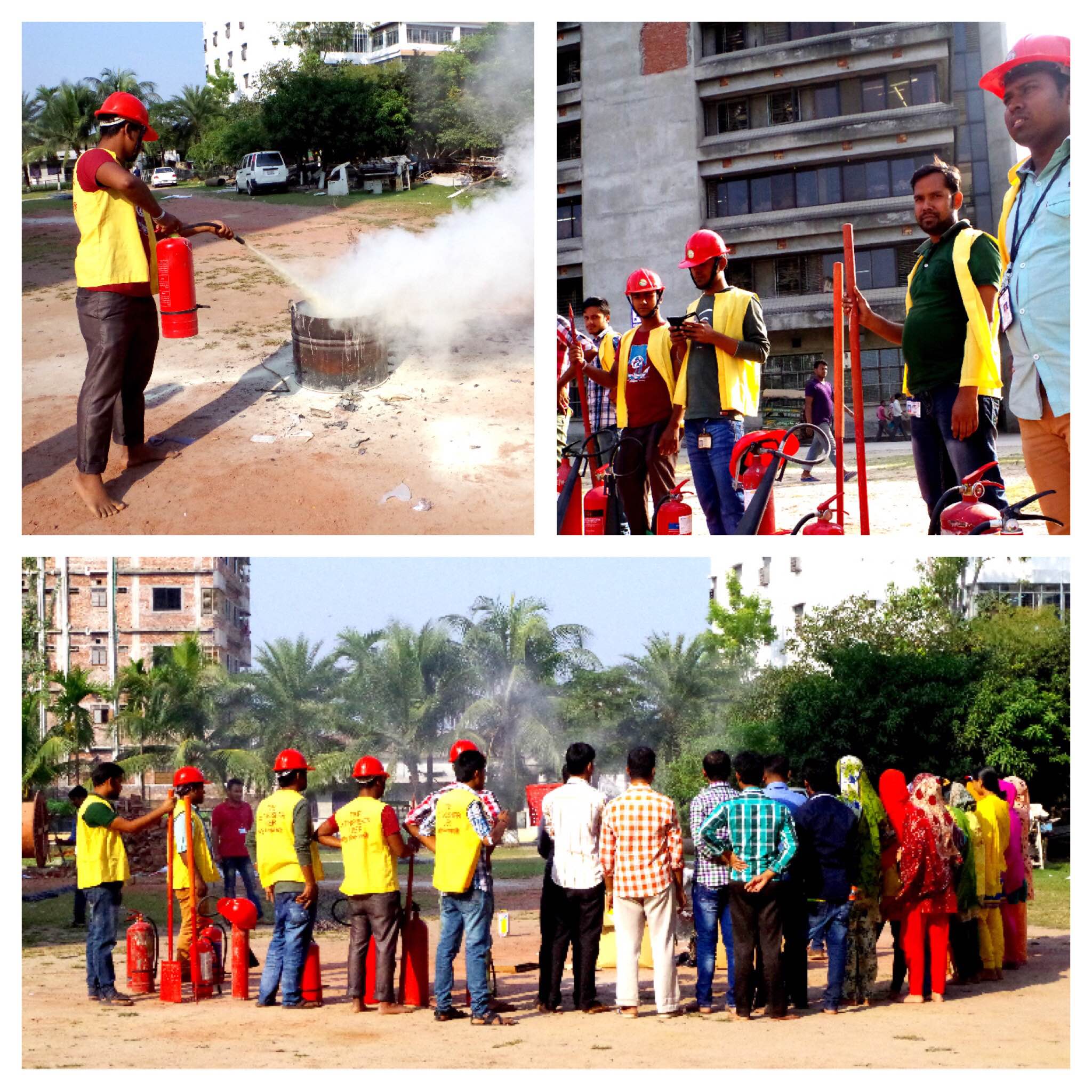
Credit: Solidarity Center
The Solidarity Center also coaches workers on how to approach factory managers about safety concerns and how to train co-workers in proper fire prevention methods. Bilkish Begun says workers at her garment factory could not discuss implementing safety measures with their employer until they formed a union because they feared they would be fired. Now, Bilkish and other women working in her factory can take measures together to ensure their safety, like organizing a fire safety training with the Solidarity Center through their union.
“I used to be afraid of fire erupting in my factory, but after attending training, I feel that if we work together, we can reduce the risk of fire in our factory.”
-BILKISH BEGUM, SOMMILITO GARMENTS SRAMIK FEDERATION
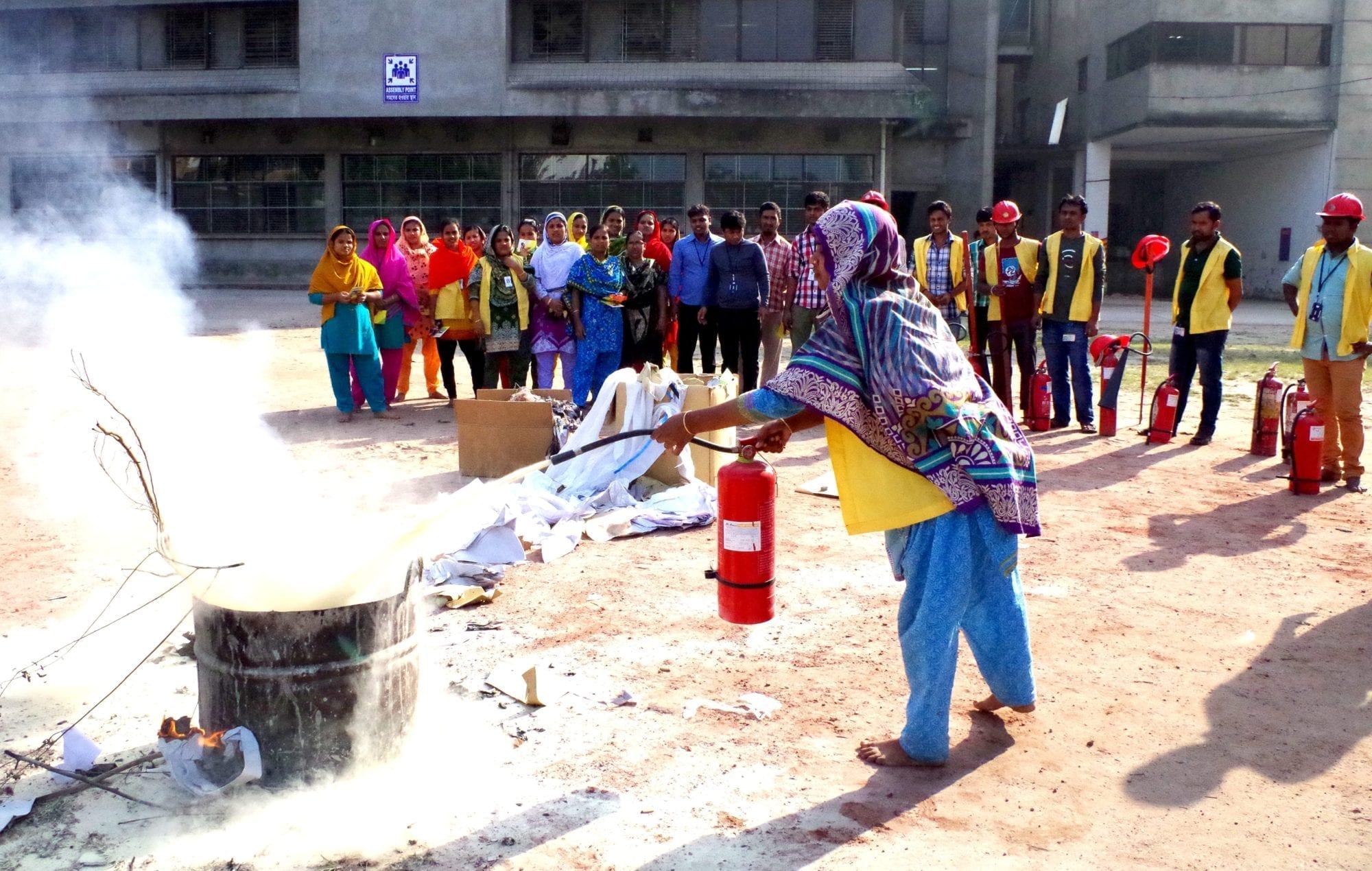
Credit: Solidarity Center

Credit: Solidarity Center
WOMEN LEADERS: CERTIFIED
82 FEMALE UNION LEADERS | 20 FEMALE FEDERATION ORGANIZERS
Training women in fire and building safety is imperative because they make up approximately 80 percent of the workforce in Bangladesh’s garment sector. As women are taking on more active roles in their unions, the Solidarity Center is empowering female garment workers to share their knowledge and skills to ensure safe work environments for everyone. The female garment workers certified through the Solidarity Center Fire and Building Safety Training have gone on to train hundreds more.
344 WOMEN HAVE ATTENDED TRAINING WITH THEIR FACTORIES.
When Shilpi Akter attended training in her capacity as Women Affairs Secretary of Reliance Denim Industries Ltd., she learned that a cluttered or crowded production floor can obstruct passage in an emergency. Noticing that her factory’s production floor was blocked by cartons, she raised this issue to management, which fixed the problem after hearing from her.
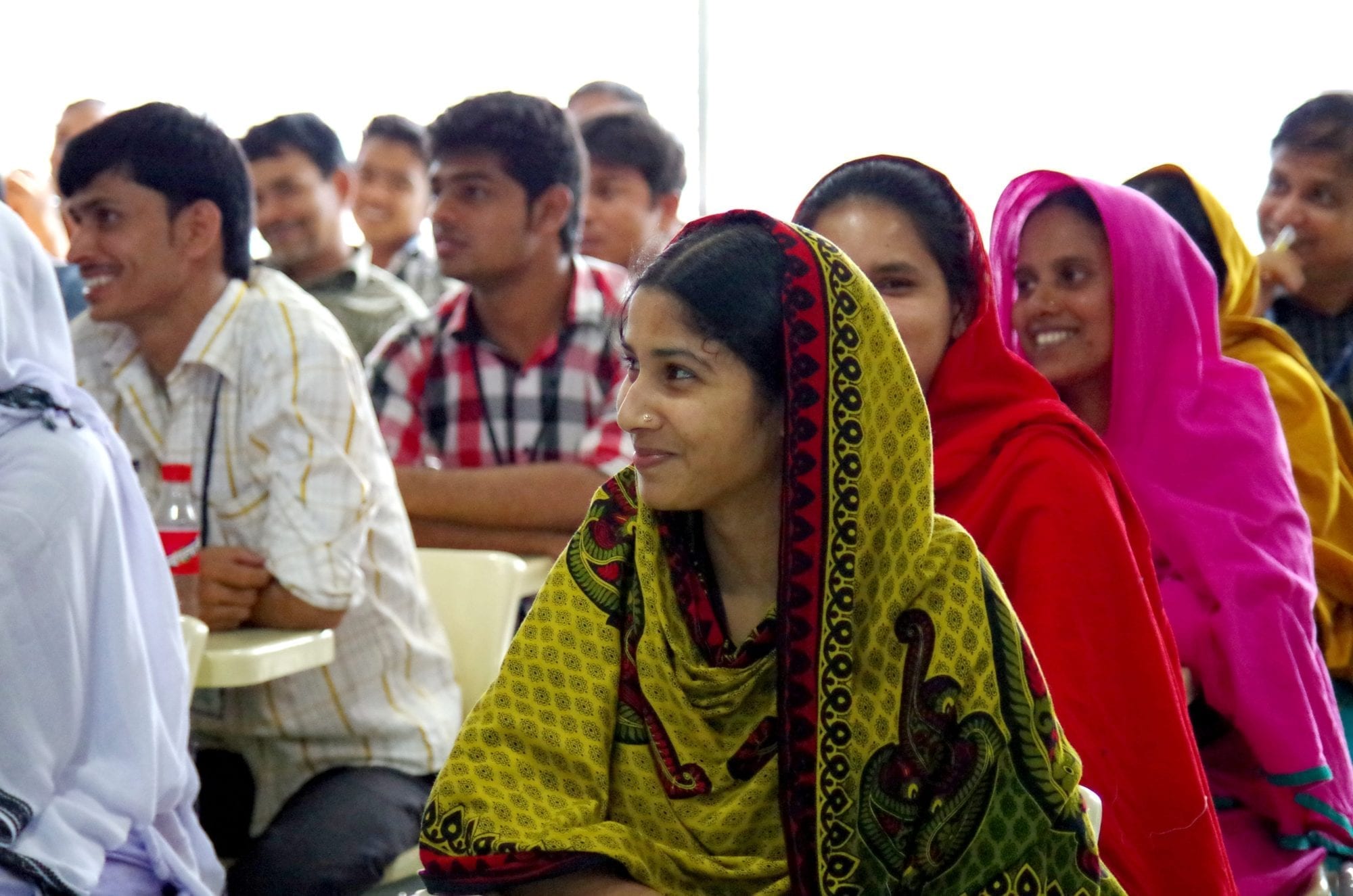
Credit: Solidarity Center
TRAIN WORKERS, SAVE LIVES
By putting what they learned through the training course into practice, participants have already diverted potential disasters in their workplaces. After attending a fire safety training last August, Monir Hassain says he is now able to identify risks and is working to minimize those risks for workers.
EXCLUDING THE TAZREEN FACTORY FIRE, 34 WORKERS HAVE DIED AND MORE THAN 1,023 HAVE BEEN INJURED IN GARMENT FACTORY FIRES SINCE 2012, ACCORDING TO DATA COMPILED BY THE SOLIDARITY CENTER IN BANGLADESH.
When an electrical short-circuit caused a generator to explode at one garment factory, Osman, president of the factory union and Popi Akter, another union leader, quickly addressed the fire and calmed panicked workers using the skills they learned through the Solidarity Center fire training. They also worked with factory management to correct other safety issues, like blocked aisles and stairwells cramped with flammable material.
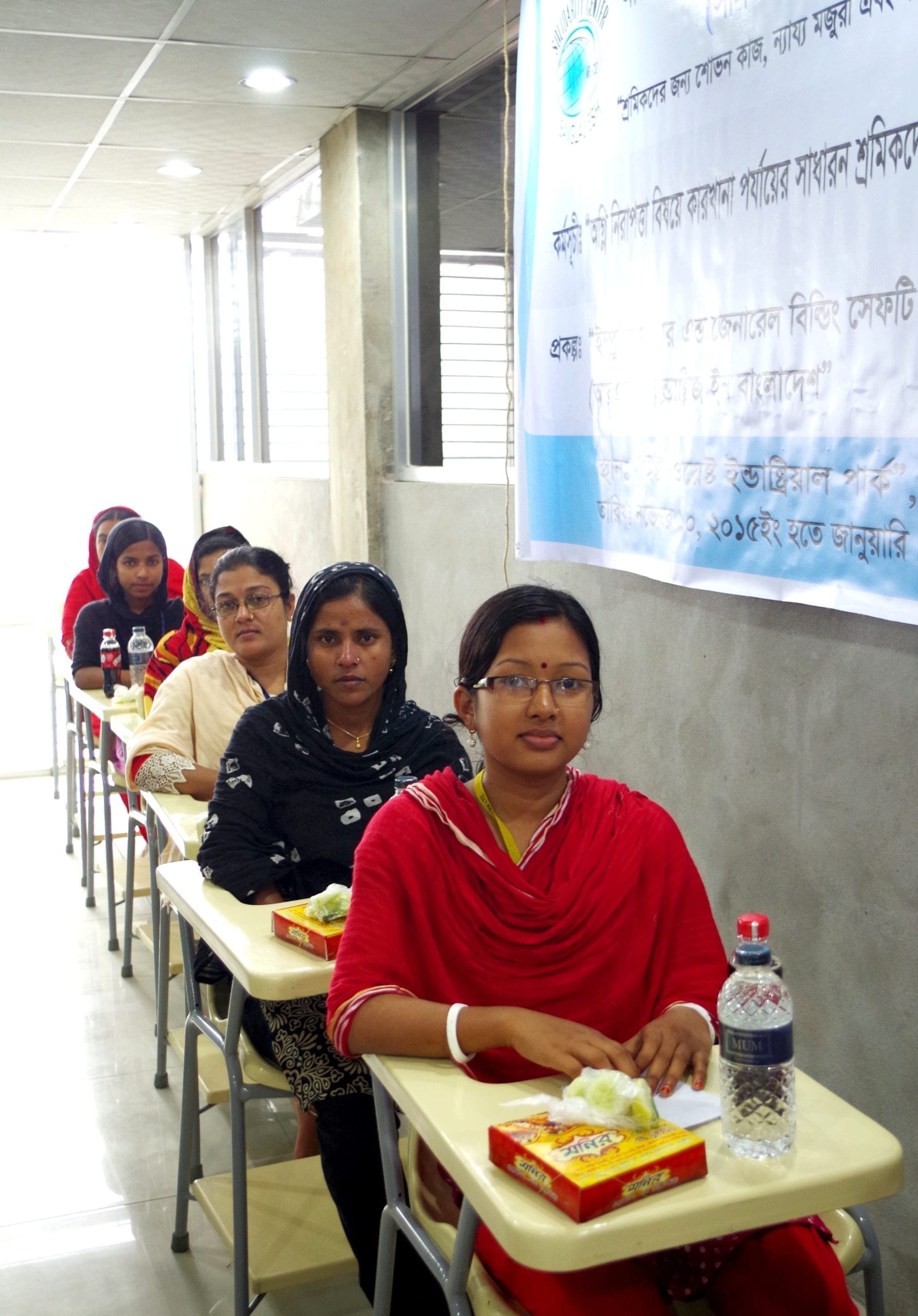
Credit: Solidarity Center
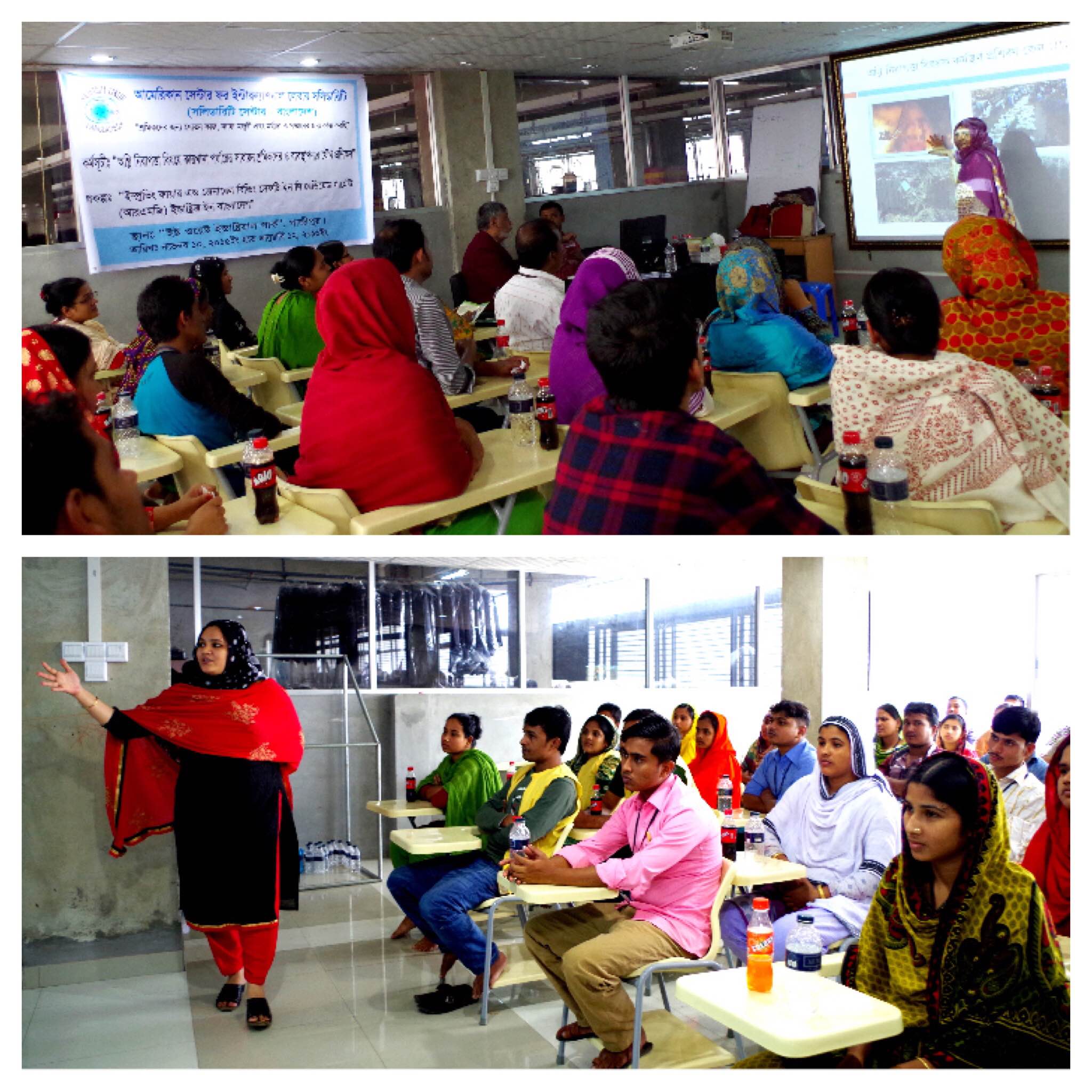
Credit: Solidarity Center
“People who worked at Tazreen and Rana Plaza had no training and had no union. This training is about making sure those things never happen again.”
-SAIFUL, UNION LEADER, RADISSON APPARELS
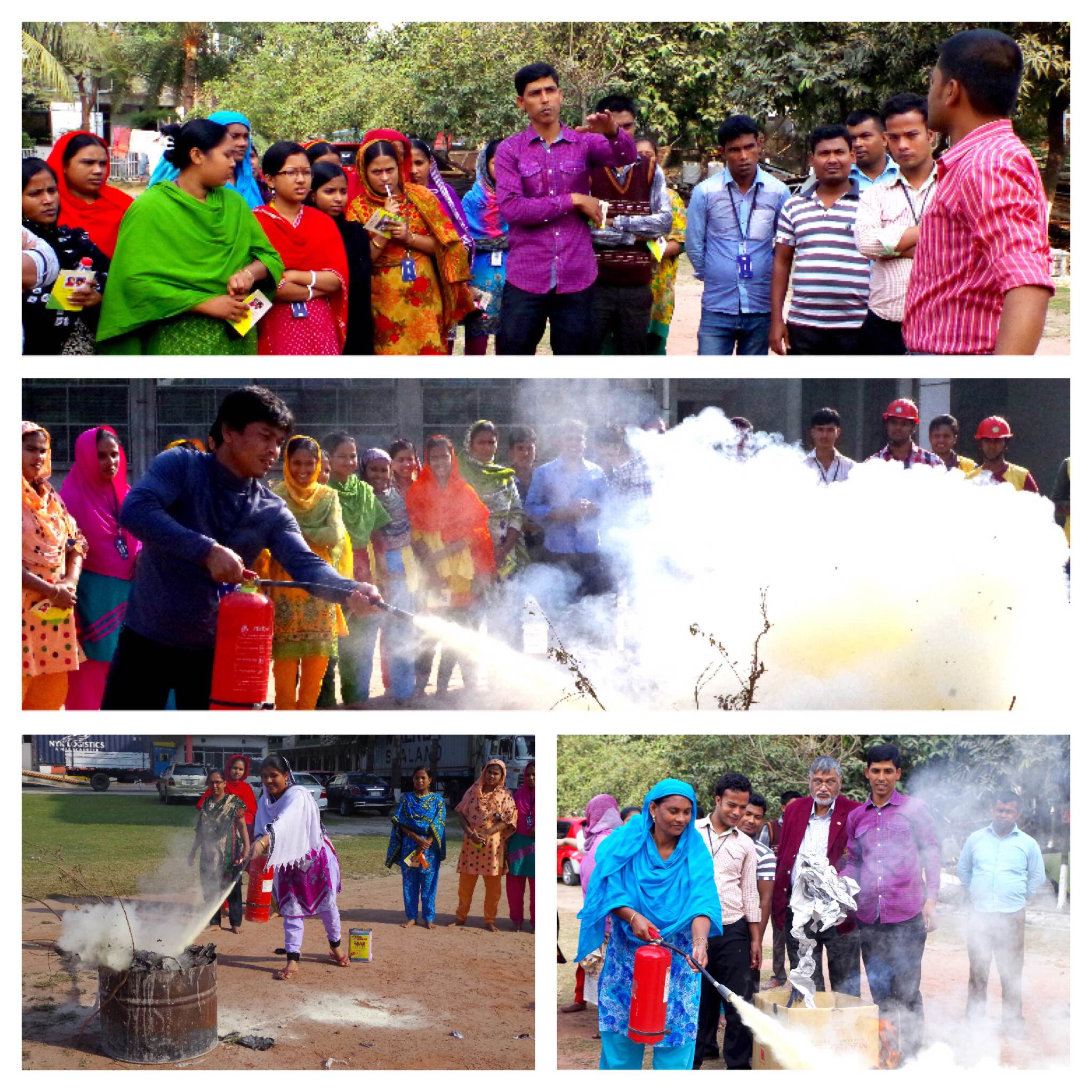
Credit: Solidarity Center
855 WORKERS TRAINED
“We need to know what to do and give workers the confidence to be leaders in their factories.”
-URMI, SOLIDARITY CENTER FIRE SAFETY TRAINING CERTIFIED
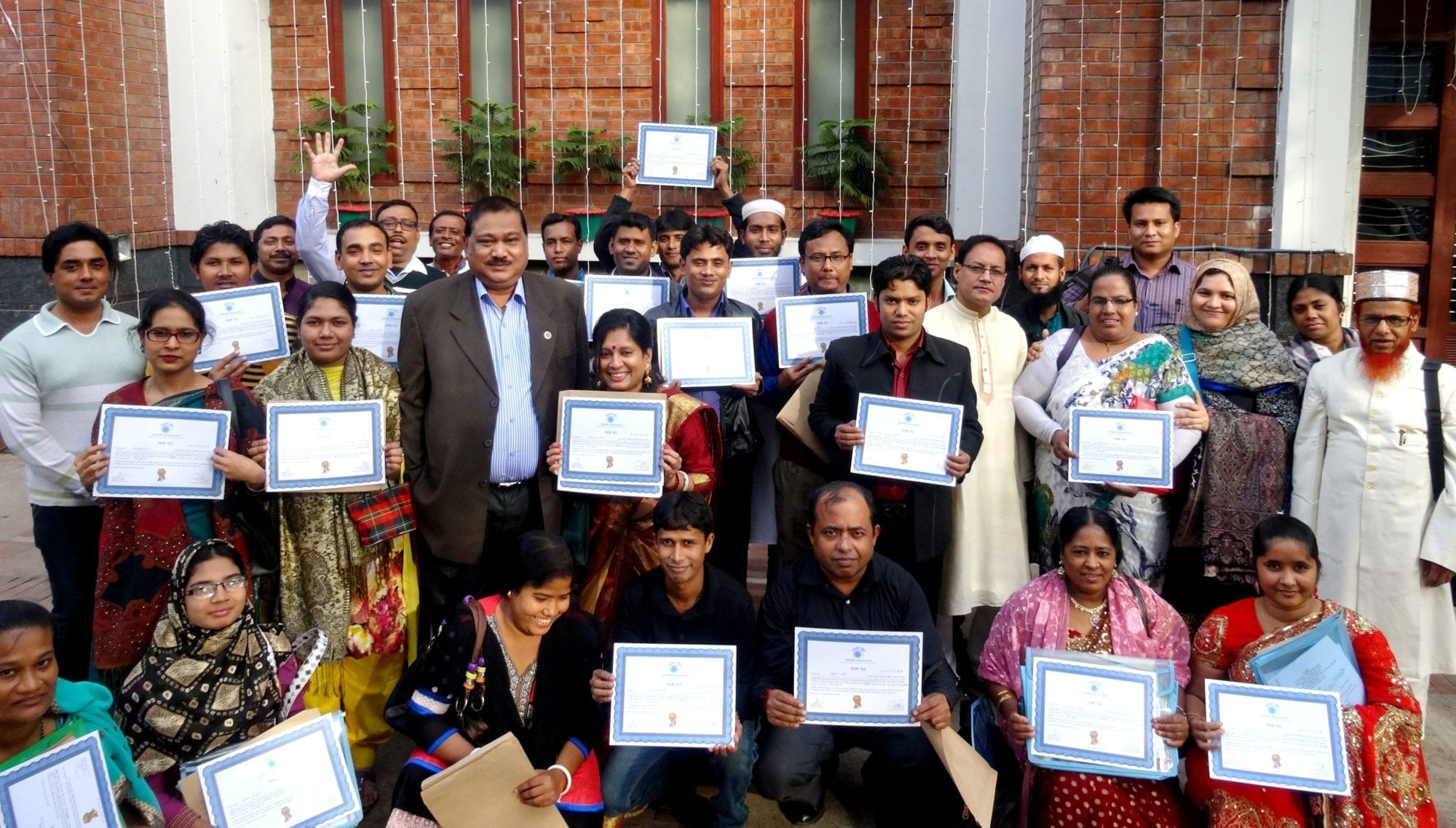
Credit: Solidarity Center
By working through their unions, garment workers can seek safe and healthy workplaces without fear of employer retaliation.
Yet fewer than 3 percent of 5,000 garment factories in Bangladesh have a union.
According to the International Labor Organization, 80 percent of Bangladeshi garment factories need to address fire and electrical safety standards.
Despite promises to improve conditions for garment workers following the Rana Plaza collapse, inspections show that by April 2016, half of all factories that pledged to reform have failed to implement sufficient fire safety measures.
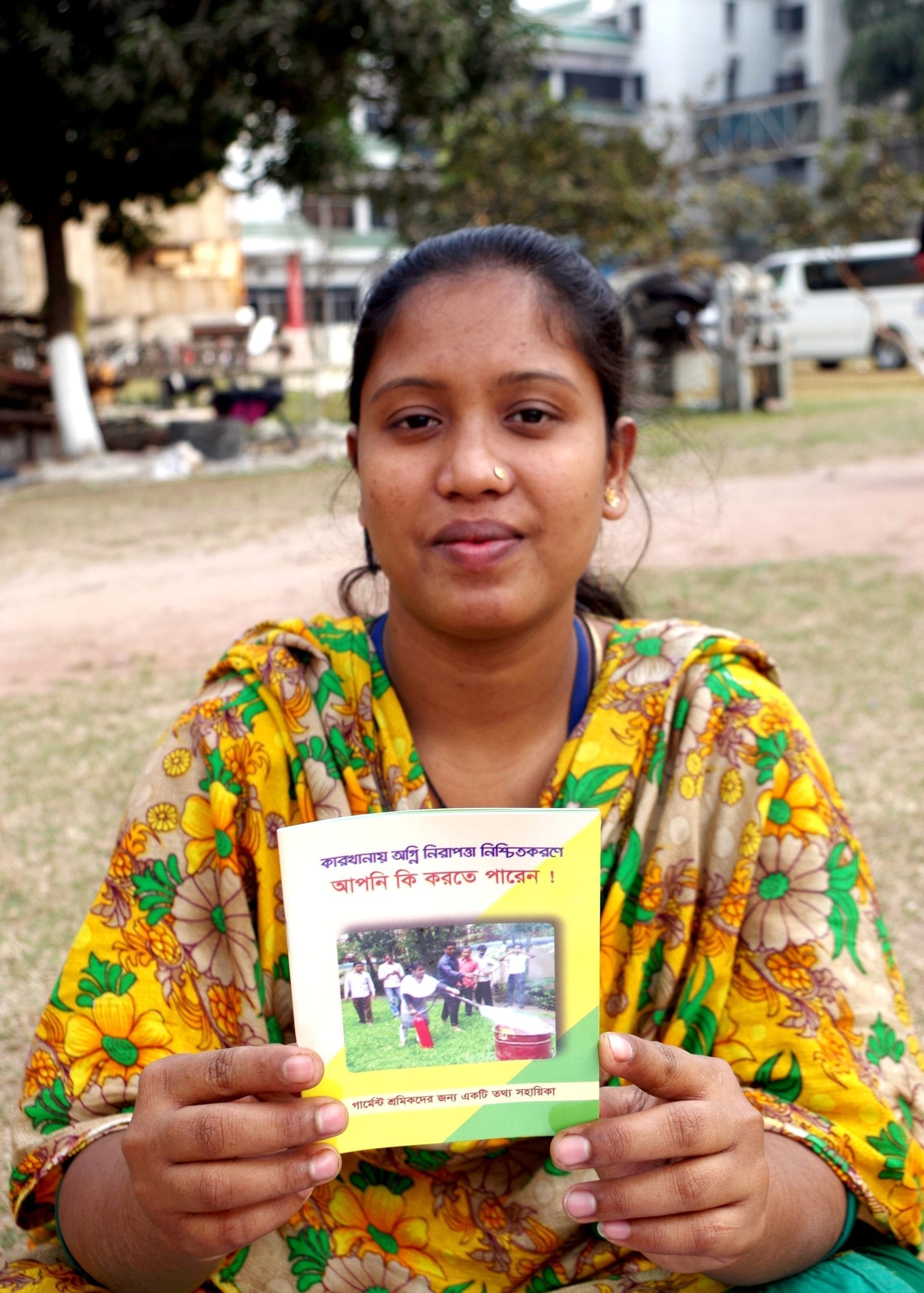
Credit: Solidarity Center
To learn more about how Bangladesh garment workers are organizing for their right to safety, visit www.solidaritycenter.org .
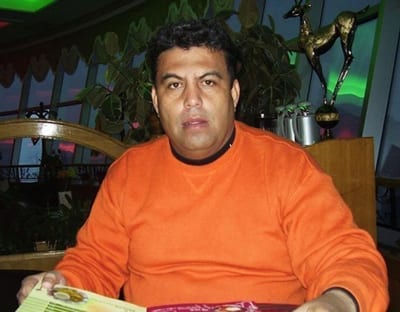
Apr 18, 2016
Since April 2015, at least 14 Honduran union leaders and members have suffered threats or violence, including one who was disappeared and another one who was murdered, part of a campaign of intimidation against worker rights documented in a new report by the Union Network against Anti-Union Violence in Honduras.
Days after the report’s release, Nelson Geovanni Núñez Chávez eceived renewed death threats for helping banana workers form unions, according to the Honduras-based nonprofit ACI-Participa. Last November, Núñez Chávez was forced to leave his home with his family after repeatedly being followed and harassed.
Nuñez Chavez is an organizer for the Honduran agricultural workers’ union, Sindicato de Trabajadores de la Agroindustria y Similares (STAS), and host of the radio program, “Unionist on the Air.”
Four of the 14 union members and leaders who were victims of violence were active in the Network against Anti-Union Violence—a trend Honduran human rights activists say is a troubling development that may indicate those who actively seek justice for perpetrators of violence are targeted for attack.
Héctor Martínez Motiño, president of a local sectional union of Workers of the National Autonomous University of Honduras (SITRAUNAH), was murdered in June despite protection from the Inter-American Commission on Human Rights (IACHR). Environmental activist Berta Cáceres Flores, who was murdered last month in Honduras, also had IACHR protection. Observers say there was no police presence around either Martínez Motiño or Cáceres when they were killed. ACI-Participa has documented the assassination of 13 recipients of precautionary measures.
Two union leaders also faced death threats as they defended worker rights at agro-industrial plantations cited in a 2012 complaint filed by the AFL-CIO and 26 Honduran unions and civil society organizations over the Central American Free Trade Agreement (CAFTA). The complaint alleges the Honduran government failed to enforce labor rights under its labor laws.
A report released yesterday by an international fact-finding commission, “Justice for Berta Cáceres Flores,” cited the “ineffectiveness of the Honduran state’s human rights protection system, as well as a prevailing institutional practice that ignores the rights of the victims of human rights violations as active rights holders.”
Honduras passed a law six months ago that protects human rights defenders, but has not issued a regulation on its implementation or enforcement.
The Network against Anti-Union Violence in Honduras, a Solidarity Center ally, was created in 2014 to document violence against union members and push for an end to impunity for those who commit such crimes. No formal statistics on violence against trade unionists existed before the network formed.



















